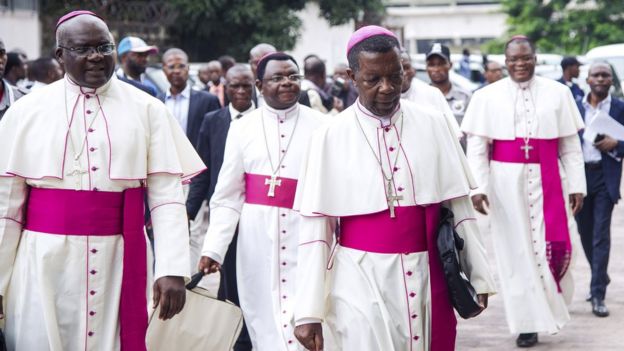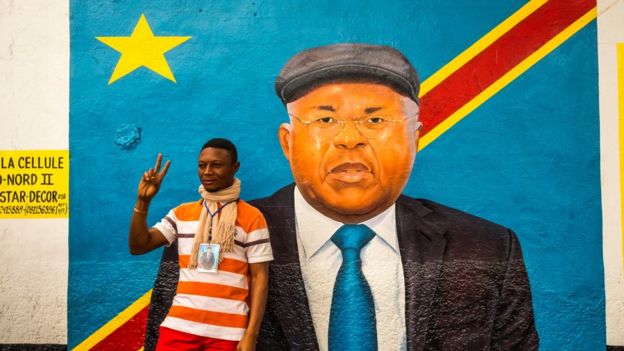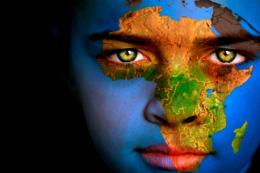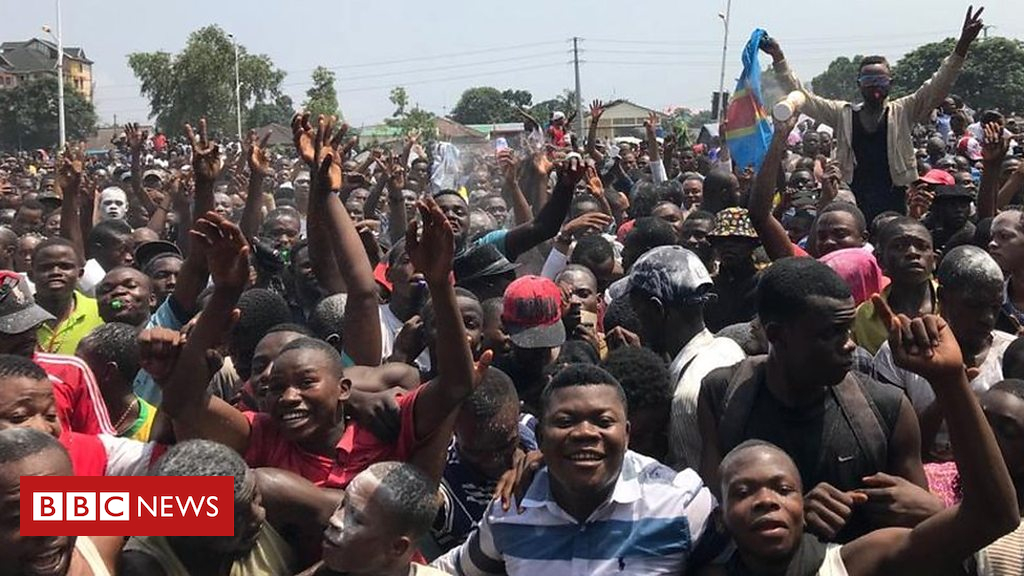| » Home » TOP HEADLINES |
| DR Congo poll: The divisive aftermath of Tshisekedi's victory |
| PHOTO: | Jubilant scenes after DR Congo winner, Felix Tshisekedi, revealed
Credit: BBC |
|
| |
|
|
By:
By Fergal Keane, BBC Africa editor, Kinshasa
|
| Posted:
Jan,11-2019 10:29:25
|
|
| |
Given the deeply polarised nature of politics in the Democratic Republic of Congo, any result was going to leave a divisive aftermath.
And already the other opposition leader, Martin Fayulu, has vowed to challenge Felix Tshisekedi's election victory in the courts.
"I will do whatever is possible for me to do to get the truth because the Congolese want change," he told the BBC.
The figures certainly surprised the powerful Catholic Church, which - according to the Reuters news agency - told diplomats a few days ago that Mr Fayulu was the clear victor.
Around 40% of DR Congo's population is Roman Catholic and the church has a wide network of schools and hospitals. It is seen by many Congolese as a moral voice in a country where politics has so often been tarnished by corruption.
 The Catholic Church organised one of the main election observer missions. Credit: Getty Images
The Church had more than 40,000 election monitors and warned that there had been irregularities.
Turnout was reportedly 48%. The full results were:
The Catholic Church organised one of the main election observer missions. Credit: Getty Images
The Church had more than 40,000 election monitors and warned that there had been irregularities.
Turnout was reportedly 48%. The full results were:
- Felix Tshisekedi - 7 million votes
- Martin Fayulu - 6.4 million votes
- Emmanuel Shadary - 4.4 million votes
Mr Tshisekedi is the first opposition leader to win the presidency since the country became independent more than 50 years ago.
In that time, kleptocracy and misrule have defined the politics of DR Congo, a country that had already experienced one of the most horrific episodes of exploitation during the colonial "scramble for Africa."
Joy and suspicion
"For so many years we have waited for this moment," a Tshisekedi supporter told me at their party headquarters in Kinshasa's Lemete neighbourhood, surrounded by cheering crowds clearly overjoyed by Mr Tshisekedi's unexpected triumph.
The mood was in sharp contrast to downcast supporters of the other opposition candidate, Mr Fayulu.
"He's not going to let his victory be stolen," said musician and Fayulu supporter Lexxus Legal. But he added: "We're calming things down because we don't want any sort of confrontation."
Rumours in recent days of talks between his party and the incumbent President Joseph Kabila have deepened suspicions among other opposition figures that this moment will not represent a decisive break with the past.
Felix Tshisekedi - his own man
 Felix Tshisekedi. Image copyright: AFP
Felix Tshisekedi. Image copyright: AFP
- Son of late veteran opposition leader Etienne Tshisekedi, who died in 2017
- He has promised to make the fight against poverty his priority
- Backed out of an opposition deal to have a unity candidate
- Ran on his own ticket with the backing of politician Vital Kamerhe
- Nicknamed "Fatshi", short for three of his names Felix Antoine Tshilombo
- Became leader of of his father's UDPS party in March 2018
- The man who stepped out of his father's shadow
But up to now he has not enjoyed a reputation for political effectiveness.
Whether Mr Tshisekedi has the intention or the capacity to challenge the powerful hold Mr Kabila enjoys over the army, security services and key ministries will determine whether politics here has really entered a new era.
He has already spoken of working with Mr Kabila to ensure the success of democracy.
For Mr Fayulu, the triumph of Felix Tshisekedi is nothing more than a "fraud" that the people will "never accept".
He has told the BBC he believes he won by a clear majority, and will challenge the result at the Constitutional Court within the 10-day period parties are allowed under the law.
Mr Fayulu has little faith that the move will succeed, but says he does not want to give outgoing President Kabila any excuse to accuse him of not following all legal avenues.
"The result is a coup and not the truth from the ballot. Mr Kabila wants to stay in power," Mr Fayulu told the BBC.
Asked if he would call on his supporters not to demonstrate on the streets, Mr Fayulu said it was the legal right of all Congolese to demonstrate within the law.
He said he feared violence if the electoral commission did not reveal what he called "the true result".
Least objectionable
Significantly, the church and civil society on Wednesday called on citizens to avoid becoming involved in violence - a recognition of the dangers involved in street protests while facing security forces with a heavy-handed reputation.
During previous protests security officers have used live rounds, leading to deaths, as well as tear gas and beatings.
 A supporter of veteran opposition chief Etienne Tshisekedi poses for a photograph with his portrait in front of his residence in Kinshasa, on July 27, 2016. Image copyright: GETTY IMAGES
Felix Tshisekedi's father Etienne - featured in the mural - was a veteran opposition politician
The declaration of Mr Tshisekedi as president does not signal an end to political crisis in DR Congo.
Any victorious candidate would have faced the looming power of President Joseph Kabila who, after 18 years in power, has proved an exceptionally resourceful political operator.
The idea that he would wish to cede any significant authority to Mr Tshisekedi is difficult to imagine at this moment.
Indeed, Mr Tshisekedi is seen by many here in DR Congo as the opposition candidate who would have been least objectionable to President Kabila.
It is perhaps significant that neither Mr Kabila nor his party has so far voiced any objection to the result.
However, it should be acknowledged that this was not a scenario Mr Kabila ever imagined back when he was clinging to power after his own mandate expired in 2016.
Sustained pressure from civil society had a profound impact in ensuring that an election - however imperfect - took place at all.
And the fact remains that Mr Tshisekedi is not the candidate handpicked by Mr Kabila.
A supporter of veteran opposition chief Etienne Tshisekedi poses for a photograph with his portrait in front of his residence in Kinshasa, on July 27, 2016. Image copyright: GETTY IMAGES
Felix Tshisekedi's father Etienne - featured in the mural - was a veteran opposition politician
The declaration of Mr Tshisekedi as president does not signal an end to political crisis in DR Congo.
Any victorious candidate would have faced the looming power of President Joseph Kabila who, after 18 years in power, has proved an exceptionally resourceful political operator.
The idea that he would wish to cede any significant authority to Mr Tshisekedi is difficult to imagine at this moment.
Indeed, Mr Tshisekedi is seen by many here in DR Congo as the opposition candidate who would have been least objectionable to President Kabila.
It is perhaps significant that neither Mr Kabila nor his party has so far voiced any objection to the result.
However, it should be acknowledged that this was not a scenario Mr Kabila ever imagined back when he was clinging to power after his own mandate expired in 2016.
Sustained pressure from civil society had a profound impact in ensuring that an election - however imperfect - took place at all.
And the fact remains that Mr Tshisekedi is not the candidate handpicked by Mr Kabila.
|
|
Source:
|
|
|
|
|
|
|
|
|
|
|
| |
| |
|
|
|
|
 The Catholic Church organised one of the main election observer missions. Credit: Getty Images
The Church had more than 40,000 election monitors and warned that there had been irregularities.
Turnout was reportedly 48%. The full results were:
The Catholic Church organised one of the main election observer missions. Credit: Getty Images
The Church had more than 40,000 election monitors and warned that there had been irregularities.
Turnout was reportedly 48%. The full results were:
 Felix Tshisekedi. Image copyright: AFP
Felix Tshisekedi. Image copyright: AFP
 A supporter of veteran opposition chief Etienne Tshisekedi poses for a photograph with his portrait in front of his residence in Kinshasa, on July 27, 2016. Image copyright: GETTY IMAGES
Felix Tshisekedi's father Etienne - featured in the mural - was a veteran opposition politician
The declaration of Mr Tshisekedi as president does not signal an end to political crisis in DR Congo.
Any victorious candidate would have faced the looming power of President Joseph Kabila who, after 18 years in power, has proved an exceptionally resourceful political operator.
The idea that he would wish to cede any significant authority to Mr Tshisekedi is difficult to imagine at this moment.
Indeed, Mr Tshisekedi is seen by many here in DR Congo as the opposition candidate who would have been least objectionable to President Kabila.
It is perhaps significant that neither Mr Kabila nor his party has so far voiced any objection to the result.
However, it should be acknowledged that this was not a scenario Mr Kabila ever imagined back when he was clinging to power after his own mandate expired in 2016.
Sustained pressure from civil society had a profound impact in ensuring that an election - however imperfect - took place at all.
And the fact remains that Mr Tshisekedi is not the candidate handpicked by Mr Kabila.
A supporter of veteran opposition chief Etienne Tshisekedi poses for a photograph with his portrait in front of his residence in Kinshasa, on July 27, 2016. Image copyright: GETTY IMAGES
Felix Tshisekedi's father Etienne - featured in the mural - was a veteran opposition politician
The declaration of Mr Tshisekedi as president does not signal an end to political crisis in DR Congo.
Any victorious candidate would have faced the looming power of President Joseph Kabila who, after 18 years in power, has proved an exceptionally resourceful political operator.
The idea that he would wish to cede any significant authority to Mr Tshisekedi is difficult to imagine at this moment.
Indeed, Mr Tshisekedi is seen by many here in DR Congo as the opposition candidate who would have been least objectionable to President Kabila.
It is perhaps significant that neither Mr Kabila nor his party has so far voiced any objection to the result.
However, it should be acknowledged that this was not a scenario Mr Kabila ever imagined back when he was clinging to power after his own mandate expired in 2016.
Sustained pressure from civil society had a profound impact in ensuring that an election - however imperfect - took place at all.
And the fact remains that Mr Tshisekedi is not the candidate handpicked by Mr Kabila.


.jpg)




